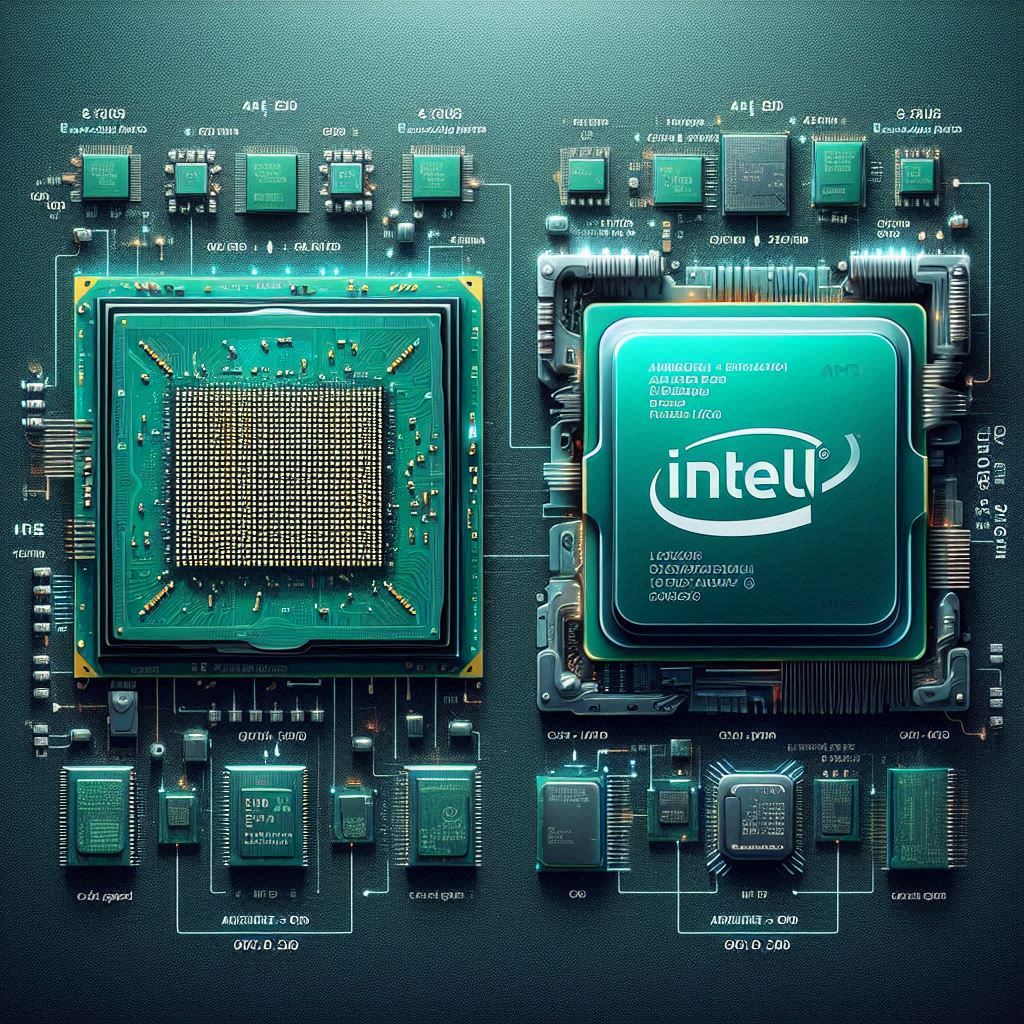Introduction
When it comes to choosing a processor for your computer, the two giants that dominate the market are Intel and AMD. Both companies have a long history of innovation and competition, pushing the boundaries of performance, efficiency, and technology. In this article, we’ll delve into a detailed comparison between Intel and AMD processors, covering aspects such as performance, price, power consumption, and specific use cases to help you make an informed decision.
Brief Comarision
| Comparision Field | Intel Proocessors | AMD Prrocesors |
| Single-Core vs Multi-Core Performance | Known for its strong single-core performance, Intel processors typically excel in tasks that rely heavily on single-threaded operations. This makes them ideal for gaming and applications where high clock speeds are crucial. | AMD processors have made significant strides in multi-core performance, especially with the Ryzen and Threadripper series. These processors shine in multi-threaded applications such as content creation, video editing, and 3D rendering. |
| Gaming | Historically, Intel has had the upper hand in gaming performance due to higher clock speeds and efficient IPC (Instructions Per Clock). Games that rely more on single-thread performance tend to perform better on Intel CPUs. | With the Ryzen series, AMD has closed the gap significantly. Ryzen 5000 series, in particular, has been praised for its competitive gaming performance, often matching or surpassing Intel in various benchmarks. |
| Price and Value | Traditionally, Intel processors have been priced at a premium. The high-end models can be quite expensive, but they offer top-notch performance for those who need the best. | AMD has built a reputation for offering great value for money. The Ryzen processors, in particular, provide excellent performance at more affordable prices, making them a popular choice for budget-conscious consumers and builders. |
| Power Consumption and Efficiency | Intel’s processors are generally known for their efficiency and lower power consumption, particularly in their laptop and mobile CPU lines. This results in better battery life and cooler operation. | AMD has made significant improvements in power efficiency with the latest Ryzen processors. However, some high-end AMD CPUs, especially the Threadripper series, can consume more power under heavy loads compared to their Intel counterparts. |
| Technological Advancements | Intel has a strong track record of technological advancements, including the development of Thunderbolt, Optane Memory, and integrated graphics with Iris Xe. They are also known for their stable platform and driver support. | AMD has been at the forefront of introducing new technologies such as PCIe 4.0 and soon, PCIe 5.0 support. Their innovative chiplet design in Ryzen processors has set new standards in the industry. AMD also offers integrated graphics with their Ryzen APUs, which are quite powerful for entry-level gaming and productivity. |
| Content Creation | While Intel also offers high-performance CPUs for content creation, AMD’s offerings often provide better value for money in this segment. | For tasks like video editing, 3D rendering, and other multi-threaded applications, AMD’s Ryzen and Threadripper processors are highly recommended due to their superior multi-core performance. |
| Gaming Utilities | If your primary focus is gaming and achieving the highest possible frame rates, Intel’s higher clock speeds and single-core performance can give you an edge. | For gamers who also engage in streaming or content creation, AMD Ryzen processors provide a good balance of gaming performance and multi-core capabilities. |
Future Prospects
Both Intel and AMD are continuously innovating and releasing new products. Intel’s upcoming Alder Lake processors and AMD’s Zen 4 architecture promise to bring even more improvements in performance and efficiency. Staying updated with the latest releases and reviews can help you make the best choice when the time comes to upgrade or build a new system.
Conclusion
In the end, the choice between Intel and AMD processors depends on your specific needs, budget, and use cases. Intel’s processors are generally preferred for gaming and applications requiring high single-core performance, while AMD’s Ryzen and Threadripper series are excellent for multi-threaded tasks and offer great value for money. By understanding the strengths and weaknesses of each, you can make an informed decision that best suits your computing needs.
Feel free to share your thoughts and experiences with Intel and AMD processors in the comments below. Happy computing!


